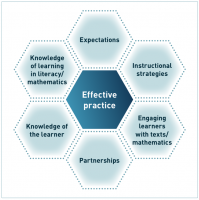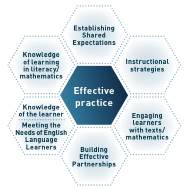Overview: Professional learning modules to support the NZC mathematics and reading and writing standards (archived)
Introduction
The modules are a key component of the professional development on the standards to be offered nationwide.
The purpose of the modules
These modules support the primary role of school leaders as they lead their schools in using the National Standards to help students meet the demands of The New Zealand Curriculum.
The modules are designed to:
- help schools understand the reading, writing, and mathematics standards and how they relate to The New Zealand Curriculum
- guide professional learning as schools embed the standards in their teaching and learning programmes
- ensure that all students build strong foundations for a lifetime of learning in the 21st century.
The users of the modules
These modules are for school leaders to use as part of self-review and within professional learning for teachers and other educators as they engage with the reading, writing, and mathematics standards for years 1–8 within The New Zealand Curriculum.
The modules support schools to consider the shifts in thinking and practice that they may need to make to fully realise the potential of the National Standards to improve literacy and numeracy outcomes for all students.
Teachers can also use the modules, either individually or in groups, as part of planned professional learning.
The content of the modules
These modules contain information that is relevant to the National Standards. They provide guidance for working with the reading, writing, and mathematics standards. They do not replicate information in the Ministry of Education resources that are already available to schools.
The modules are based upon the dimensions of effective practice, as shown below.
Modules:
Establishing shared expectations
Building effective partnerships
Knowledge of the learner
Meeting the needs of English language learners
Knowledge of literacy learning
Knowledge of mathematics learning
Engaging learners with texts
Engaging learners with mathematics
Return to top
The structure of the modules
Each module has an introduction and three main sections:
- Key outcome of the module, which states the key outcome and why the outcome is important
- Reflective questions for school leaders and teachers, which suggest questions to guide the use of the activities and inquiries chosen to meet identified professional learning needs
- Focused activities for school leaders and teachers, which outlines some professional development activities that relate to the reflective questions.
A final section, Resources and references, lists texts cited or quoted in the module along with resources that include useful information about mathematics learning.
Key outcomes of the modules
Key outcomes | Module
| Key outcome
|
|---|
| Establishing shared expectations
| School leaders, teachers, students, parents, families, whānau, communities, and boards of trustees understand the expectations in reading, writing, and mathematics at each year level as outlined in the National Standards.
|
| Building effective partnerships
| Partners (students, teachers, school leaders, boards of trustees, families, whānau, communities, and providers of educational support) work together to provide opportunities to improve student progress and achievement in reading, writing, and mathematics.
|
| Knowledge of the learner
| Teachers and students understand the need for overall teacher judgments in relation to the National Standards and the process of making and using such judgments.
|
| Meeting the needs of the English language learner
| Schools recognise the diversity of English language learners and provide them with the language learning support needed to enable them to access the New Zealand Curriculum at year-appropriate levels as soon as possible. This is achieved through policies, processes, teaching and assessment practices, professional development, the equitable use of resources, and effective communications with families.
|
| Knowledge of literacy learning
| School leaders and teachers develop a shared understanding of the reading and writing demands of their school curriculum.
|
| Knowledge of mathematics learning
| School leaders and teachers develop a shared understanding of the mathematics demands of their school curriculum and of how these reflect the expectations of The New Zealand Curriculum and the mathematics standards.
|
| Engaging learners with texts
| Teachers use and combine knowledge of their students, of expected outcomes, of the curriculum demands, and of the opportunities that specific texts offer. This enables them to support their students in developing and using reading and writing as 'interactive tools' in all curriculum areas.
|
| Engaging learners with mathematics
| School leaders and teachers develop their understandings of how to effectively engage students with mathematics and statistics.
|
Return to top
How to use the modules
The modules are designed to inform inquiry. They are integrated with existing resources and ways of working and they lend themselves to multiple pathways of professional learning.
The modules are to be used in ways that best meet the needs and purposes of the school, school leaders, teachers, and school community. For example, some or all of the modules can be used for:
- whole-school, syndicate, or team professional learning workshops
- individual or group self-paced study
- working with school community groups, such as parents, families, whānau, communities, boards of trustees, and marae groups (selected reflective questions and/or activities can be used to build partnerships and share expectations)
- 'repeat visits', that is, re-using a module to explore one or more areas of the school or to explore the needs of targeted groups of students, teachers, parents, or others.
Choosing a sequence for using the modules
Schools do not need to follow a fixed sequence when using the modules. However, the modules assume that schools have begun to engage with the reading, writing, and mathematics standards.
It is recommended that leaders introduce the standards and then examine the module Establishing shared expectations in some depth before working with one or more of the other modules in a sequence chosen to meet their school’s identified needs.
Using the modules with the self-review tools as part of inquiry
Each group with responsibility for student learning in the school, from the board of trustees through to the teaching staff, should be involved in cycles of professional inquiry to improve outcomes for their students.
In the first instance, this may involve the use of the National Standards self-review tools. Schools will then pursue further inquiries as they regularly reflect (broadly or in detail) on students’ progress and achievement during the year. The modules are designed to support such inquiries.
Return to top
Core resources
The modules rely on the use of a suite of essential, core resources as well as other resources that may be specific to a module or activity. The core resources are available in every school and to every teacher. Some of these resources are specific to literacy or numeracy; others apply to wider areas.
Many of these resources are also available online and can be accessed by the links below.
The National Standards
Learning progressions
Curriculum and pedagogy
Best evidence syntheses
Key ministry strategies
Information about diverse ethnic groups in New Zealand
- Bell, D. (Ed.). (2005). New to New Zealand. Auckland: Reed Books.
Return to top


